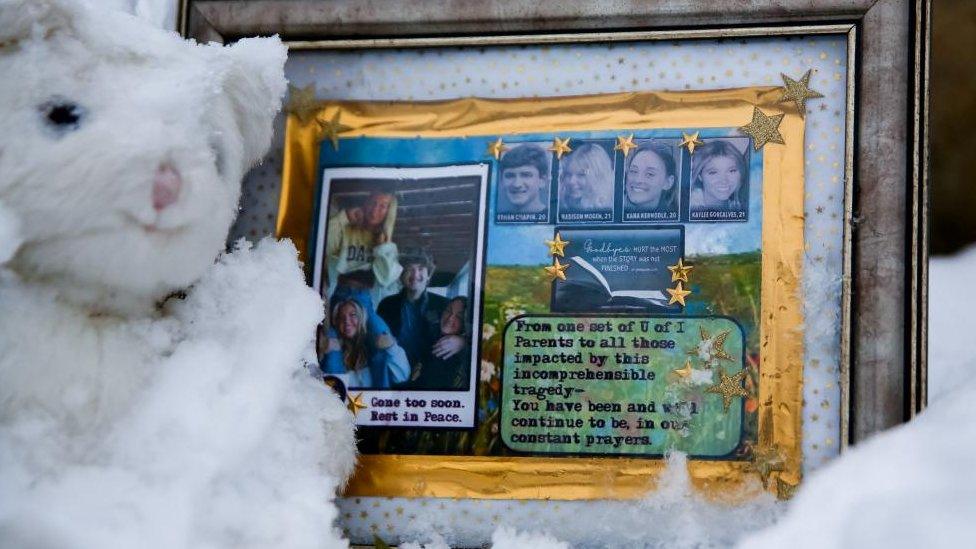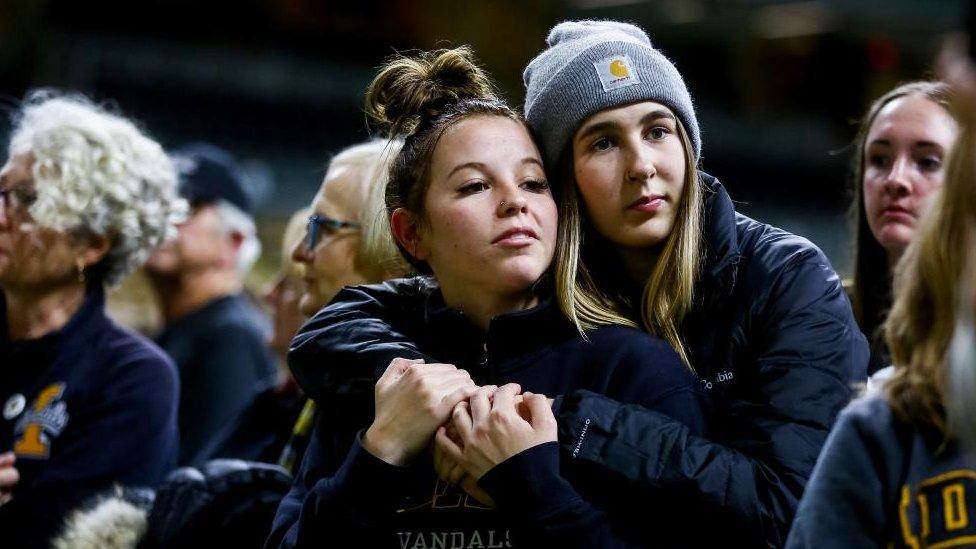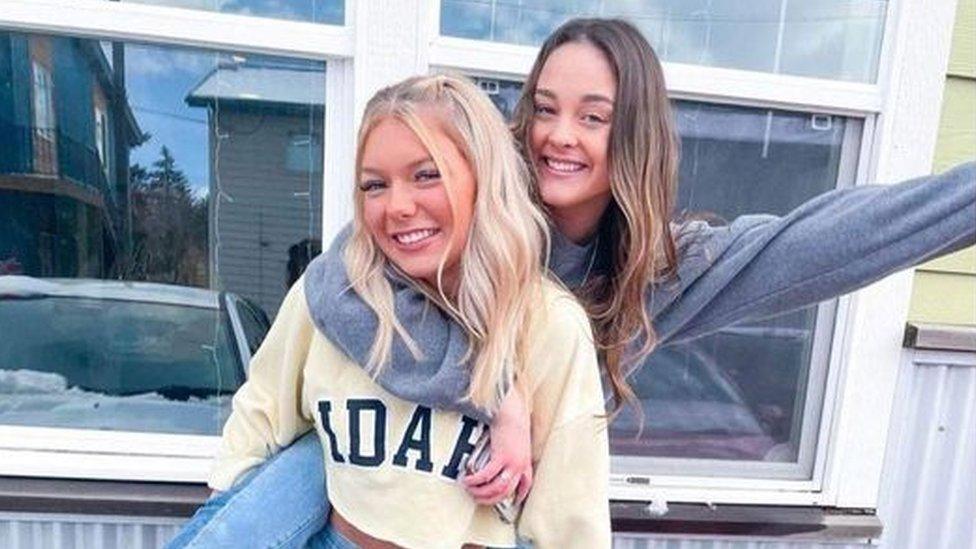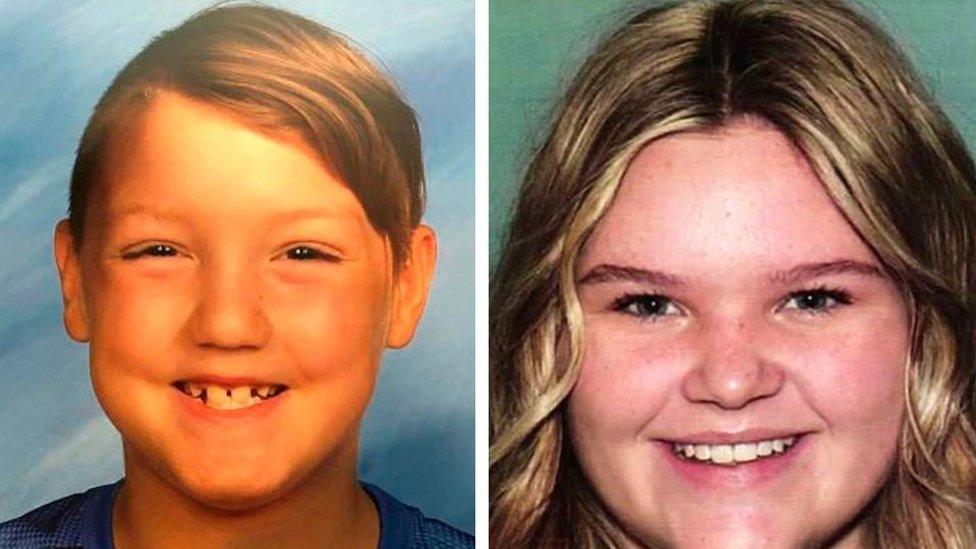Idaho student murders: The things we still don't know
- Published

The four victims were all aged 20 or 21
Questions continue to swirl around the grisly slaying of four University of Idaho students found dead on 13 November, with no suspects named or arrests made.
The students are believed to have been asleep in their beds when they were stabbed to death.
Officials have reversed course on several aspects of the probe, including about whether the attack was targeted.
The case has been plagued by rumours and amateur web sleuths.
The four students - Xana Kernodle and Ethan Chapin, both 20, and 21-year-olds Kaylee Goncalves and Madison Mogen - were all found fatally stabbed at an off-campus house in the town of Moscow, Idaho at about noon on Sunday, 13 November, after police received a 911 call about an unconscious person. Each victim had been stabbed multiple times, and some had defensive wounds.
A preliminary timeline pieced together of the hours before suggested nothing out of the ordinary. Mr Chapin and Ms Kernodle had spent the previous night at a party on campus, while Ms Mogen and Ms Goncalves were at a bar before ordering a meal from a food truck shortly before 01:45 local time.
All four students are believed to have returned to their home without incident by about 02:00. Another two students - who survived the attack - had returned home about an hour earlier.
In a statement, police said the two survivors had called friends to the residence "because they believed that one of the second-floor victims had passed out and was not waking up". Investigators do not believe the two survivors were involved in the murders.
Details of what happened in the house in the early hours of that day remain scant, although police have noted that there were no signs of forced entry or damage to the property.
The murder weapon, which is believed to be a fixed-blade knife, has not been recovered. In the first days of the investigation, businesses across the area were contacted to see if similar knives had recently been sold.
The investigation has also been plagued by conflicting information and rumours.
On 15 November, for example, Moscow Police issued a statement in which they said they believed the attack was "isolated" and "targeted". The statement, and another later that day, also said that investigators believed there was no "imminent" or "ongoing" threat to the public.
An update published on 30 November, however, characterised the statement as a "miscommunication".

The murders and subsequent mystery have shaken the town of Moscow, Idaho. (Pictured: University of Idaho students at a vigil)
"Detectives do not currently know if the residence or any occupants were specifically targeted but continue to investigate," the 30 November statement said. Adding to the confusion, the Moscow Police website continues to claim that while police believe the attack was targeted, they have not "concluded if the target was the residence or its occupants".
Authorities have also been forced to repeatedly address unverified rumours or investigative details - some of them being rapidly spread online by an army of web sleuths - including potential connections to a 1999 stabbing in Washington and a 2021 stabbing in Oregon.
Speculation about a connection to a September altercation between local residents and a knife-wielding cyclist led to a referral for misdemeanour charges, although police have said that incident was unrelated to the murders.
Additionally, police dispelled suggestions from friends and family of Kaylee Goncalves that she had a stalker.
"Investigators have looked extensively into information received about Kaylee having a stalker," Moscow Police said in a statement. "They have pursued hundreds of pieces of information related to this topic but have not verified or identified a stalker."
A neighbour of the students, Jeremy Reagan, was also forced to publicly defend himself from "ruthless" social media users who speculated that he may have been involved in the killings.
"I didn't do it," he told NewsNation. "I'm willing to give DNA, fingerprints, whatever they need."
As the investigation continues with the help of state police and the FBI, authorities are urging the public to come forward if they have any information and to avoid spreading baseless rumours.
"There is speculation, without factual backing, stoking community fears and spreading false facts," the most recent police statement said. "We encourage referencing official releases for accurate information and updated progress."
Related topics
- Published1 December 2022

- Published19 November 2022

- Published26 May 2021
